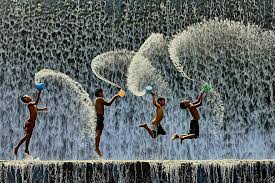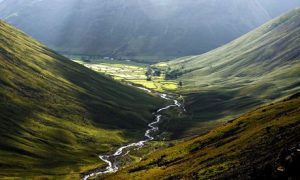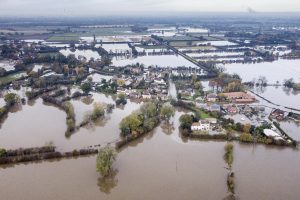What have you done this morning? I’m not talking in terms of work, but instead those little everyday activities you probably complete without even thinking about them. Things like brushing your teeth, that first coffee of the day, having a shower or if you are still able to get out and about, the commute into the office. Now stop and think…how many of those everyday activities have a connection with water?
To coincide with the launch of our new membership site, World of Water, in this week’s blog we are going to take a brief look at the importance of water in our world, how it is not only a fundamental of life but also a destructive force, and why we need more engineers to maintain that balance.
Water – a requirement of life!
Let’s start with some fun facts, did you know:
- An average person uses about 54 cubic meters of water per year (www.statista.com)
- 70% of the human brain is water compared to a jellyfish which is made up of 95% (https://www.water-plus.co.uk/fresh-thinking-hub/amazing-facts-about-water)
- A person can live about a month without food, but only a week without water (although I wouldn’t recommend trying either); and
- It takes 75 litres of water to make one pint of beer (https://www.water-plus.co.uk/fresh-thinking-hub/amazing-facts-about-water)
Water is truly a wonderful thing. When we start thinking about how much we rely on it in our everyday life, it comes as no surprise that it is one of the first things NASA searches for when they are on the lookout for extra-terrestrial life or possible habitable planets of the future.

In simple terms, we cannot survive without it, whether it be for drinking, good hygiene, supplying our complex eco-systems or hydrating our crops.
Historically, we have also used water to develop our world, from powering our mills through hydroelectricity and the development of civilisations around our major rivers and seas. Water has quite literally shaped us into who we are today.
Concerningly, however, the United Nations estimates that in just over 10 years from now, almost 1.8 billion people will live in areas where water is scarce and around two out of three people around the world could live in what they describe as ‘water stress conditions’ (https://www.un.org/press/en/2015/sgsm16831.doc.htm).
Water the destructive force
When not in lockdown, two of my favourite places to go to are Scotland and the Lake District. There is something about that connection with nature and the great outdoors that is irresistible and being somewhere completely remote a welcome break from the hustle of everyday life. When I do manage to put on my walking boots and waterproofs, something that always amazes me is that moment when you stand in a valley with a tiny stream, knowing that you are actually watching is the power of water. The fact that these impressive geological features have been created over thousands of years by running water and shifting glaciers.

Over recent years we have also seen the power of water live, through increased rainfall and flooding, rising sea levels or natural disasters such as Tsunamis.
We have some big problems ahead!
Maintaining that balance has always been a constant challenge and the UN have highlighted what they see as the main water-related challenges of the future:
- 2 billion people lack access to safely managed drinking water services. (WHO/UNICEF 2019)
- Over half of the global population or 4.2 billion people lack safely managed sanitation services. (WHO/UNICEF 2019)
- 297,000 children under five die every year from diarrhoeal diseases due to poor sanitation, poor hygiene, or unsafe drinking water. (WHO/UNICEF 2019)
- 2 billion people live in countries experiencing high water stress. (UN 2019)
- 90 per cent of natural disasters are weather-related, including floods and droughts. (UNISDR)
- 80 per cent of wastewater flows back into the ecosystem without being treated or reused. (UNESCO, 2017)
- Around two-thirds of the world’s transboundary rivers do not have a cooperative management framework. (SIWI)
- Agriculture accounts for 70 per cent of global water withdrawal. (FAO)
- Roughly 75 per cent of all industrial water withdrawals are used for energy production. (UNESCO, 2014).
This identification of these potential issues led to the development of the UN Sustainable Development Goals (SDG) being set by World Leaders in 2015 with SDG 6 being specifically related to water. In summary, it stated that:
“Ensure availability and sustainable management of water and sanitation for all”.

So how are we going to achieve this?
This will require a collective approach from everyone, from our decision-makers to everyday users. It will also need the skill of our engineers across all of the water sector, from those that deal with its supply, drain our roads and turn the power of water into a usable force.
Worryingly, however, the industry has been facing shortages for some time, with the UK Commission for Employment and Skills (UKCES) recently publishing a report which found that almost a third of the vacancies in water and related industries is due to a skills shortage. To add to this, the report also found that the number of positions left vacant due to the water industry employers not being able to find anyone to fill the roles has risen by 130% since 2011.
In short, we need to do more to educate people on the importance of maintaining our balance with water, as well as the exciting opportunities a career in the industry can bring…our very survival may depend on it.
Want to know more?
If you have enjoyed this blog and are excited to know more about the water industry, why not get in touch via the contacts page, to find out you could take advantage of an exclusive offer of two months free membership to World of Water. By becoming a member, you will have access to a range of CPD’s, product information and blog posts as well as the opportunity to connect with like minded professionals to share knowledge and grow. What are you waiting for?